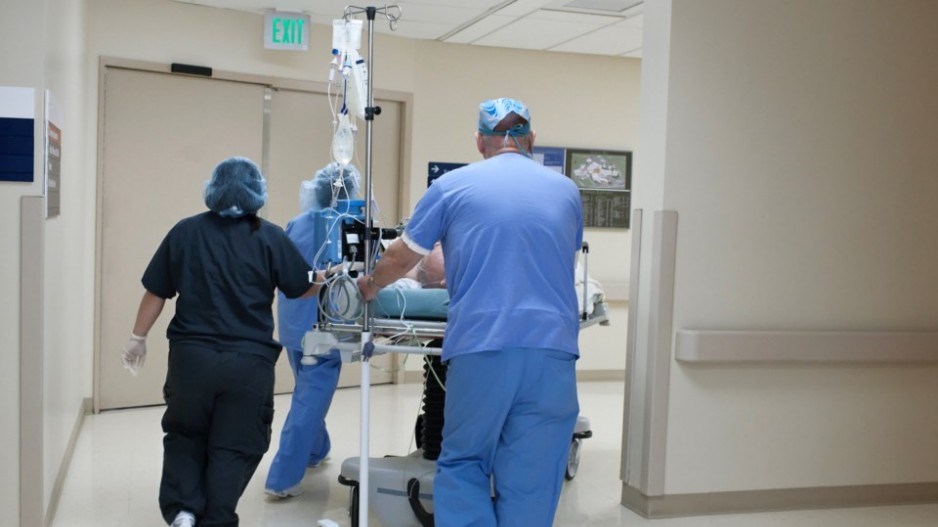The B.C. government is embarking on a glossy new marketing campaign to try and lure away American nurses to come work in our provincial hospitals.
It will undoubtedly feature majestic mountains, the grandeur of the Pacific Ocean and images of all sorts of outdoorsy hipsters doing outdoorsy, hipster-y things while draped head-to-toe in Arc'teryx.
What you won’t see, though, is the day-to-day reality of many nurses in this province — the rising tide of threats, abuse, crammed hospitals, overworked conditions, the revolving door of people in drug-induced distress, folks shouting obscenities, threats of violence, actual violence, stabbings, machete-wielding attackers and more.
There was no mention of any of that in the recruiting package outlined by Health Minister Josie Osborne and Premier David Eby on Monday. Their main pitch seemed to be: We don’t have Donald Trump, so you should come here.
“President Trump’s loss is British Columbia’s gain,” said Eby.
It was left to the BC Nurses’ Union to explain the disconnect of a government focused on recruiting people from abroad into jobs that have a more than 50 per cent attrition rate within five years back here at home.
“You cannot simply put all of the investment into recruitment strategies,” said Tristan Newby, BCNU vice-president. “If you're not creating a safe, sustainable environment, you're going to lose the people that you have. And that is what's happening.”
There’s a deficit of more than 6,000 nurses currently in B.C., said Newby. The government is nowhere near its promised nurse-to-patient ratio levels. It’s not possible for B.C. to recruit its way out of that hole if it’s also losing members to burnout, stress, overwork and fear within a system in which WorkSafeBC claims for violence against nurses have doubled within the last decade, said Newby.
“It's not uncommon now to see headlines of a nursing student being stabbed, a nurse being strangled unconscious, these are significant considerations that people are going to place into whether I want to move into British Columbia, or whether I want to go into the profession of nursing,” said Newby.
“If I know that I'm not going to be safe on the job, then I'm less likely to choose that profession.”
He cited three violent instances in the last six months at just one hospital, Port Moody’s Eagle Ridge. There, threatened emergency room staff while screaming and yelling in January.
At Vancouver General Hospital, a nurse was in late March at the inpatient psychiatric unit, while her colleagues scrambled to drag her to safety behind a nursing station. A student nurse at VGH in November.
Eby said part of the problem is the shortage of nurses creates a more stressful experience for everyone in the system.
“It’s a challenging thing because it’s a chicken-and-egg scenario, it’s hard to recruit nurses into a stressful environment to work in and retain them, but the only thing to address it is to recruit more nurses,” he said.
Eby said he hopes to “storm the gates with every single possible approach” to getting more nurses, including measures he announced Monday to bypass third-party verification of American nursing credentials in a bid to turn what could be a four-month accreditation from the B.C. College of Nurses and Midwives into one that might only take a few days (that timeline does not factor in the federally controlled immigration process, which could still take months).
Another issue in hospital safety is the “relational security officers,” who aren’t armed or able to fully address violence on site, said Opposition BC Conservative public safety critic Elenore Sturko.
Sturko was able to score an admission from Solicitor General Garry Begg in the legislature recently that the security staff, who his ministry licenses, may not have the training required to handle the weapons they are encountering inside health-care facilities.
“One of the ideas that could be pursued or looked at is like a health authority police … maybe in some of those higher-risk areas that we’ve seen, or in places where they’re experiencing a higher incidence of weapons,” said Sturko, describing a system not unlike the Metro Vancouver Transit Police.
“They would be able to take custody then, of someone who’s apprehended by another police agency, and they could go and free up.”
The BC Nurses’ Union has expressed support for the idea of hospital police. Eby said he’s satisfied with existing relational security officers.
“What we are hearing from nurses is they are seeing improvements and they want more of these relational security guards,” he said.
Still, security guards that can’t actually keep B.C. hospitals secure, is not a great selling point for the system. Just another thing B.C. will have to avoid putting into its recruitment package as it seeks to lure away nurses from other countries to fill vacancies that exist in this province for reasons the government has failed to address.
Rob Shaw has spent more than 17 years covering B.C. politics, now reporting for CHEK 撸奶社区 and writing for Lodestar Media. He is the co-author of the national bestselling book A Matter of Confidence, host of the weekly podcast Political Capital, and a regular guest on CBC Radio.
[email protected]
馃毃New newsletter alert! Stay ahead of the curve in B.C. politics. Get expert political analysis delivered straight to your inbox, plus inside scoops and other stories from across the province.



